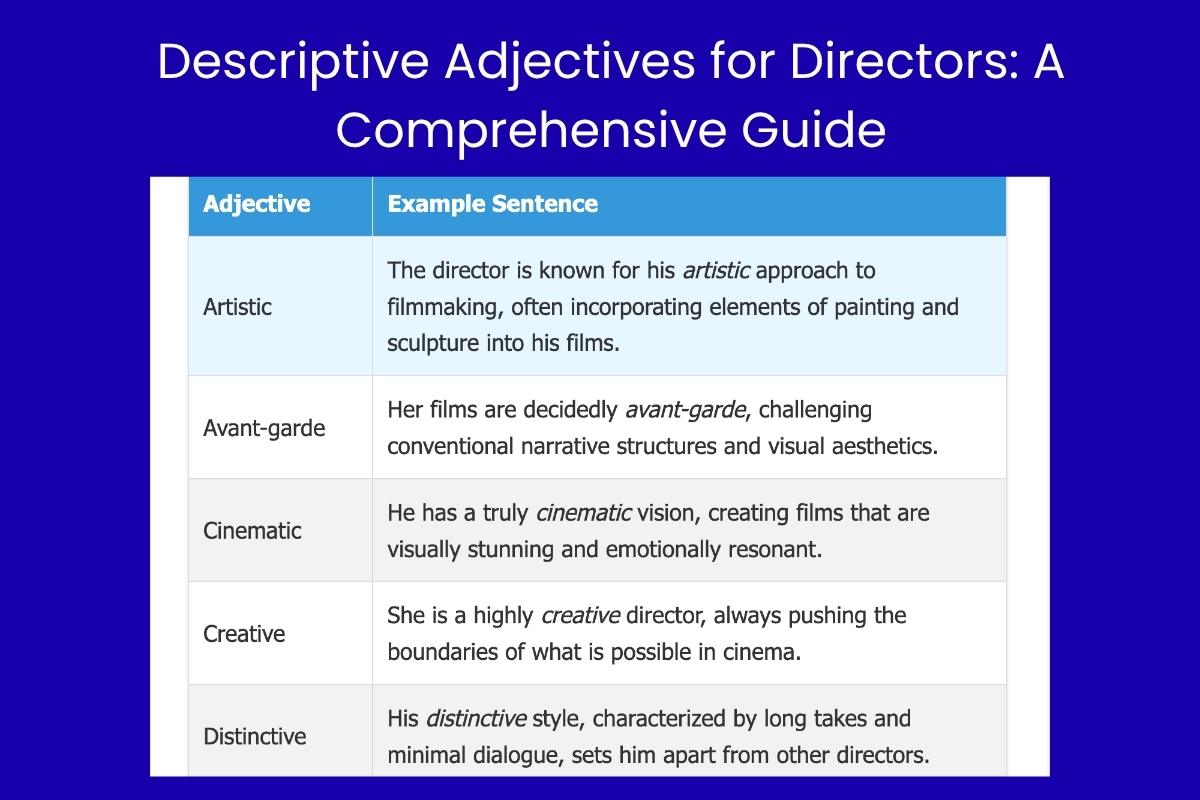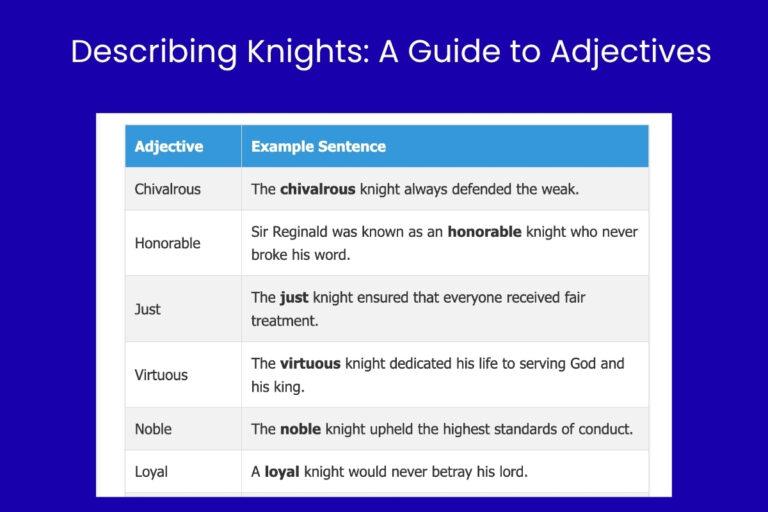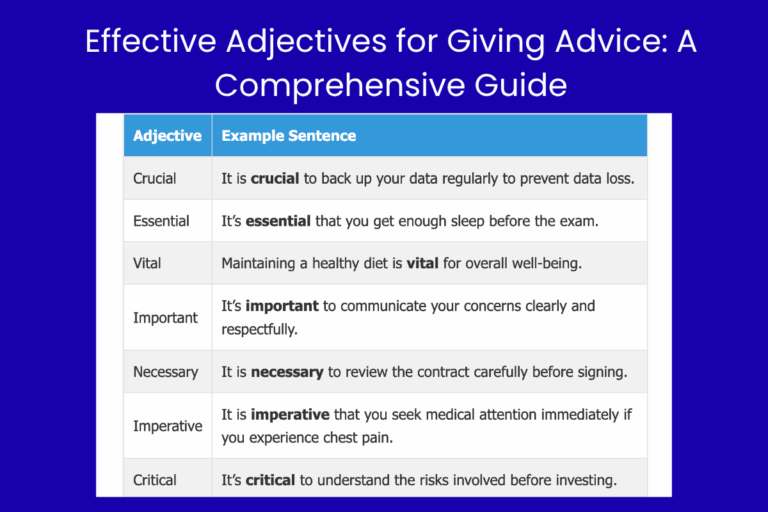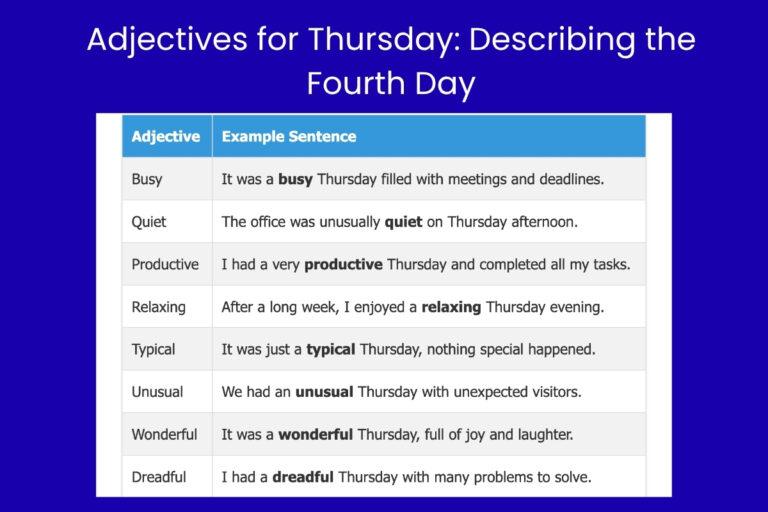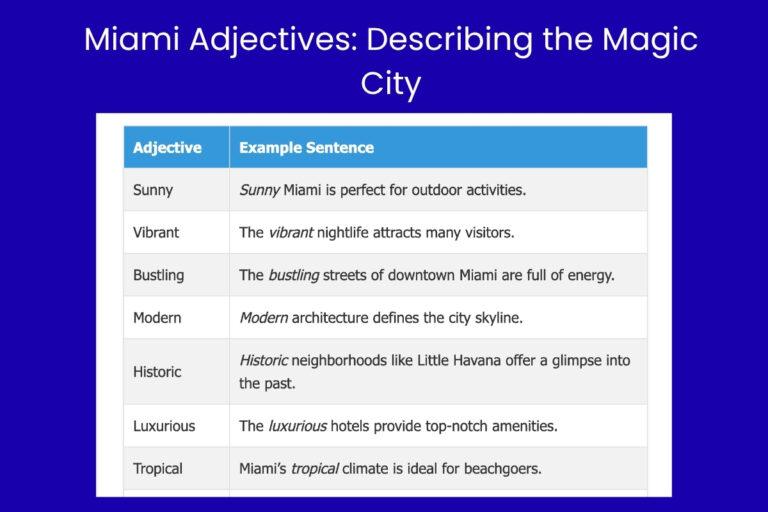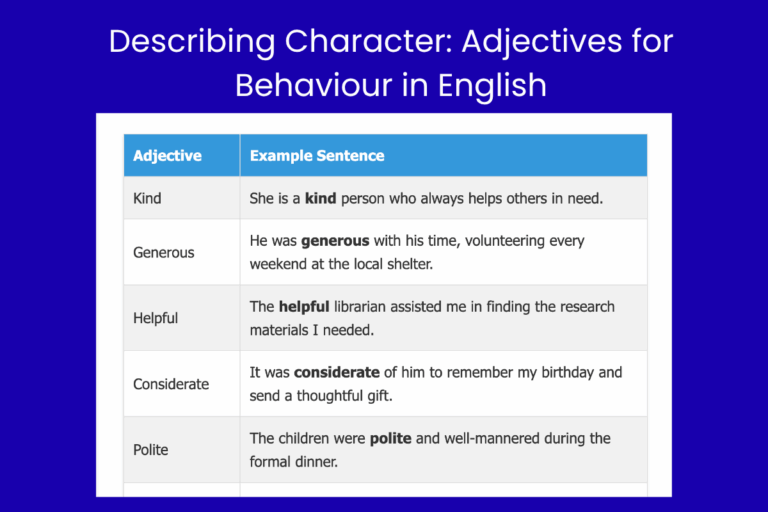Descriptive Adjectives for Directors: A Comprehensive Guide
Understanding how to use adjectives to describe directors is essential for film students, critics, and anyone involved in the film industry. Adjectives add depth and nuance to your descriptions, allowing you to accurately convey a director’s style, vision, and impact. This guide provides a comprehensive overview of adjectives commonly used for directors, offering clear definitions, examples, and practical exercises to enhance your understanding and usage.
Whether you’re writing a film review, discussing a director’s work in an academic setting, or simply engaging in conversations about cinema, mastering these adjectives will significantly improve your ability to articulate your thoughts and opinions effectively. This article is designed for English language learners, film enthusiasts, and anyone looking to expand their vocabulary and improve their descriptive writing skills.
Table of Contents
- Definition of Adjectives for Directors
- Structural Breakdown
- Types and Categories of Adjectives for Directors
- Examples of Adjectives for Directors
- Usage Rules for Adjectives for Directors
- Common Mistakes When Using Adjectives for Directors
- Practice Exercises
- Advanced Topics
- Frequently Asked Questions
- Conclusion
Definition of Adjectives for Directors
Adjectives used to describe directors are words that modify nouns or pronouns, providing more information about a director’s qualities, style, techniques, or impact. These adjectives help to paint a vivid picture of the director’s approach to filmmaking and allow for a more nuanced understanding of their work. They can be used in film reviews, academic analyses, or casual discussions about movies.
Adjectives can be classified based on their function, such as descriptive adjectives (e.g., innovative, meticulous), which describe the director’s style or approach. They can also be evaluative adjectives (e.g., brilliant, controversial), which express an opinion or judgment about the director. Understanding these classifications helps in choosing the most appropriate adjective for a given context.
The context in which adjectives are used is crucial. For example, describing a director as “experimental” implies a willingness to take risks and deviate from conventional filmmaking techniques. In contrast, “commercial” suggests a focus on appealing to a broad audience and achieving box office success. The choice of adjective significantly influences the perception of the director and their work.
Structural Breakdown
Adjectives typically precede the noun they modify (e.g., “the visionary director”) but can also follow a linking verb (e.g., “the director is innovative“). Understanding this basic structure is essential for constructing grammatically correct sentences.
Adjectives can be modified by adverbs to further refine their meaning (e.g., “a highly acclaimed director,” “an extremely meticulous director”). Adverbs add another layer of detail, allowing for even more precise descriptions.
In some cases, multiple adjectives can be used to describe a director, providing a more comprehensive portrait (e.g., “a talented, ambitious, and innovative director”). When using multiple adjectives, it’s important to consider their order and ensure they flow smoothly within the sentence.
Types and Categories of Adjectives for Directors
Adjectives for directors can be grouped into several categories based on the aspect of the director they describe. These categories include style and vision, technical skill, collaborative qualities, thematic focus, and personal qualities.
Adjectives Describing Style and Vision
These adjectives focus on the director’s artistic approach and unique perspective. They capture the essence of their filmmaking style and the overall vision they bring to their projects.
Examples include: artistic, avant-garde, cinematic, creative, distinctive, experimental, flamboyant, imaginative, innovative, lyrical, modern, original, poetic, realistic, stylish, surreal, unique, visionary.
Adjectives Describing Technical Skill
These adjectives highlight the director’s mastery of filmmaking techniques and their ability to execute their vision effectively. They focus on the technical aspects of directing, such as cinematography, editing, and sound design.
Examples include: adept, accomplished, competent, dexterous, efficient, expert, masterful, meticulous, precise, proficient, skilled, technical.
Adjectives Describing Collaborative Qualities
These adjectives emphasize the director’s ability to work effectively with actors, crew members, and other collaborators. They highlight their communication skills, leadership abilities, and their approach to teamwork.
Examples include: approachable, collaborative, communicative, cooperative, diplomatic, empathetic, inspiring, leaderly, open-minded, patient, supportive, team-oriented.
Adjectives Describing Thematic Focus
These adjectives describe the recurring themes and subject matter that the director explores in their films. They provide insight into the director’s interests and the messages they seek to convey through their work.
Examples include: anthropological, biographical, controversial, critical, cultural, dark, dramatic, historical, political, psychological, satirical, socially conscious, thought-provoking.
Adjectives Describing Personal Qualities
These adjectives describe the director’s personal characteristics and traits that influence their filmmaking. They offer a more intimate understanding of the director’s personality and how it impacts their work.
Examples include: ambitious, assertive, charismatic, dedicated, determined, disciplined, eccentric, enigmatic, passionate, persistent, reclusive, reserved, sensitive, stubborn.
Examples of Adjectives for Directors
The following tables provide examples of how these adjectives can be used in sentences to describe directors. Each table focuses on a specific category of adjectives, offering a range of examples to illustrate their usage.
Examples Describing Style and Vision
This table provides examples of adjectives that describe a director’s artistic style and vision.
| Adjective | Example Sentence |
|---|---|
| Artistic | The director is known for his artistic approach to filmmaking, often incorporating elements of painting and sculpture into his films. |
| Avant-garde | Her films are decidedly avant-garde, challenging conventional narrative structures and visual aesthetics. |
| Cinematic | He has a truly cinematic vision, creating films that are visually stunning and emotionally resonant. |
| Creative | She is a highly creative director, always pushing the boundaries of what is possible in cinema. |
| Distinctive | His distinctive style, characterized by long takes and minimal dialogue, sets him apart from other directors. |
| Experimental | The director’s experimental techniques often involve unconventional camera angles and editing styles. |
| Flamboyant | His flamboyant visuals and over-the-top characters have made him a cult favorite. |
| Imaginative | She is an imaginative storyteller, creating fantastical worlds and compelling characters. |
| Innovative | The director is celebrated for his innovative use of special effects and groundbreaking storytelling techniques. |
| Lyrical | His films are often described as lyrical, with a poetic quality that resonates with audiences. |
| Modern | She brings a modern sensibility to classic themes, creating films that are both timeless and relevant. |
| Original | His original approach to filmmaking has earned him critical acclaim and a dedicated following. |
| Poetic | The director’s poetic imagery and evocative music create a dreamlike atmosphere. |
| Realistic | He is known for his realistic portrayal of everyday life, capturing the nuances of human relationships. |
| Stylish | Her films are incredibly stylish, with a focus on fashion, design, and visual aesthetics. |
| Surreal | The director’s surreal imagery and dreamlike sequences create a sense of unease and disorientation. |
| Unique | His unique vision and unconventional approach to storytelling have made him a celebrated filmmaker. |
| Visionary | She is a visionary director, creating films that are both artistically ambitious and commercially successful. |
| Expressive | The director’s work is notably expressive, conveying deep emotion through visual storytelling. |
| Provocative | His provocative style challenges viewers and sparks important conversations. |
| Unconventional | She is known for her unconventional approach to narrative structure and character development. |
| Spectacular | His films are known for their spectacular visual effects and breathtaking action sequences. |
| Whimsical | Her films often have a whimsical quality, blending fantasy and reality in delightful ways. |
| Intimate | He is known for creating intimate portraits of characters and their inner lives. |
| Gritty | His films offer a gritty and realistic portrayal of urban life. |
| Elegant | Her films are known for their elegant cinematography and sophisticated storytelling. |
Examples Describing Technical Skill
This table provides examples of adjectives that describe a director’s technical abilities and expertise.
| Adjective | Example Sentence |
|---|---|
| Adept | He is an adept director, capable of handling complex camera movements and intricate editing techniques. |
| Accomplished | She is an accomplished filmmaker, having mastered all aspects of film production. |
| Competent | He is a competent director, capable of delivering a solid and well-made film. |
| Dexterous | The director’s dexterous handling of the camera creates a dynamic and engaging viewing experience. |
| Efficient | He is an efficient director, able to manage time and resources effectively. |
| Expert | She is an expert in visual effects, creating stunning and seamless illusions on screen. |
| Masterful | His masterful command of the camera and editing creates a visually stunning and emotionally resonant film. |
| Meticulous | She is a meticulous director, paying close attention to every detail of the production. |
| Precise | His precise direction ensures that every shot is perfectly composed and timed. |
| Proficient | She is a proficient director, capable of working in a variety of genres and styles. |
| Skilled | He is a skilled cinematographer, creating visually stunning and evocative images. |
| Technical | His technical expertise is evident in the seamless integration of special effects and CGI. |
| Astute | The director has an astute understanding of film editing, creating a seamless and engaging narrative. |
| Resourceful | She is a resourceful director, able to overcome challenges and find creative solutions to problems. |
| Versatile | He is a versatile director, capable of working in a variety of genres and styles. |
| Impeccable | Her impeccable attention to detail ensures that every aspect of the film is perfect. |
| Articulate | The director is articulate in conveying his vision to the cast and crew. |
| Talented | He is a talented director with a natural ability for storytelling. |
| Seasoned | The seasoned director brought years of experience to the project. |
| Adept | She’s an adept director when it comes to working with child actors. |
| Calculated | His calculated camera movements added to the suspense. |
| Controlled | The director’s controlled pacing kept the audience engaged. |
| Disciplined | A disciplined approach to filmmaking was evident in every scene. |
| Astounding | His astounding technical skills made the impossible possible. |
| Remarkable | She demonstrated remarkable proficiency in visual effects. |
| Virtuosic | The director’s virtuosic use of the camera was breathtaking. |
Examples Describing Collaborative Qualities
This table provides examples of adjectives that describe a director’s ability to work with others.
| Adjective | Example Sentence |
|---|---|
| Approachable | He is an approachable director, creating a relaxed and collaborative atmosphere on set. |
| Collaborative | She is a collaborative director, valuing the input and ideas of her cast and crew. |
| Communicative | He is a communicative director, clearly articulating his vision and expectations. |
| Cooperative | She is a cooperative director, always willing to listen to suggestions and compromise when necessary. |
| Diplomatic | He is a diplomatic director, able to navigate conflicts and maintain a positive working environment. |
| Empathetic | She is an empathetic director, understanding and sensitive to the needs of her actors. |
| Inspiring | He is an inspiring director, motivating his cast and crew to give their best performance. |
| Leaderly | She is a leaderly director, confidently guiding her team and making decisive decisions. |
| Open-minded | He is an open-minded director, willing to consider new ideas and perspectives. |
| Patient | She is a patient director, taking the time to work with actors and help them develop their characters. |
| Supportive | He is a supportive director, encouraging his cast and crew to take risks and experiment. |
| Team-oriented | She is a team-oriented director, fostering a sense of camaraderie and shared purpose on set. |
| Considerate | The director was considerate of the actors’ needs and concerns. |
| Respectful | She is known for being a respectful and supportive leader on set. |
| Understanding | The understanding director always listened to the crew’s feedback. |
| Harmonious | He fostered a harmonious working environment for everyone involved. |
| Accessible | The director was accessible and always willing to discuss ideas with the team. |
| Encouraging | She was an encouraging presence, motivating everyone to do their best work. |
| Facilitative | The director’s facilitative style helped bring out the best in the actors. |
| Inclusive | An inclusive approach to directing ensured everyone felt valued. |
| Personable | The personable director made everyone feel at ease. |
| Receptive | The director was always receptive to new ideas and suggestions. |
| Thoughtful | A thoughtful approach to collaboration was evident in every scene. |
| Adaptable | The adaptable director was able to adjust to changing circumstances on set. |
| Gracious | The gracious director made sure to thank everyone for their hard work. |
| Tactful | The tactful director knew how to handle difficult situations with grace. |
Examples Describing Thematic Focus
This table provides examples of adjectives that describe the themes explored in a director’s films.
| Adjective | Example Sentence |
|---|---|
| Anthropological | His films often take an anthropological approach, exploring different cultures and societies. |
| Biographical | She is known for her biographical films, which tell the stories of influential figures. |
| Controversial | His films are often controversial, tackling sensitive and taboo subjects. |
| Critical | She takes a critical look at social and political issues in her films. |
| Cultural | His films offer a cultural perspective on identity, immigration, and belonging. |
| Dark | Her films often explore dark themes of violence, despair, and alienation. |
| Dramatic | He is known for his dramatic storytelling, creating emotionally charged and suspenseful narratives. |
| Historical | She specializes in historical dramas, bringing important events from the past to life. |
| Political | His films are often political, addressing issues of power, corruption, and social justice. |
| Psychological | She is a psychological filmmaker, exploring the inner workings of the human mind. |
| Satirical | His films are satirical, using humor and irony to critique social norms and institutions. |
| Socially conscious | She is a socially conscious director, using her films to raise awareness about important issues. |
| Thought-provoking | His films are often thought-provoking, prompting viewers to question their assumptions and beliefs. |
| Existential | Her films often explore existential themes of meaning and purpose. |
| Philosophical | He is known for his philosophical approach to filmmaking, exploring complex ideas and concepts. |
| Humanistic | Her films offer a humanistic perspective on the human condition. |
| Emotive | The director’s films are deeply emotive, evoking strong feelings in the audience. |
| Personal | He brought a personal touch to the film, drawing from his own experiences. |
| Cynical | A cynical view of society often permeates his films. |
| Idealistic | The idealistic director sought to inspire change through her work. |
| Moralistic | A moralistic message was central to the film’s narrative. |
| Nostalgic | His films often evoke a nostalgic feeling for the past. |
| Romantic | She is known for her romantic comedies that celebrate love. |
| Subversive | The director’s subversive themes often challenged societal norms. |
| Topical | Her films are known for addressing topical issues in a timely manner. |
| Visionary | The visionary director tackled complex social issues with a unique perspective. |
Examples Describing Personal Qualities
This table provides examples of adjectives that describe a director’s personality and characteristics.
| Adjective | Example Sentence |
|---|---|
| Ambitious | He is an ambitious director, always striving to create groundbreaking and impactful films. |
| Assertive | She is an assertive director, confidently taking charge and making decisive decisions. |
| Charismatic | He is a charismatic director, able to inspire and motivate his cast and crew. |
| Dedicated | She is a dedicated director, pouring her heart and soul into every project. |
| Determined | He is a determined director, overcoming obstacles and challenges to achieve his vision. |
| Disciplined | She is a disciplined director, maintaining a strict schedule and adhering to her creative plan. |
| Eccentric | His eccentric personality and unconventional approach to filmmaking have made him a cult figure. |
| Enigmatic | She is an enigmatic director, shrouded in mystery and intrigue. |
| Passionate | He is a passionate director, infusing his films with energy and enthusiasm. |
| Persistent | She is a persistent director, never giving up on her vision, even in the face of adversity. |
| Reclusive | He is a reclusive director, rarely giving interviews or making public appearances. |
| Reserved | She is a reserved director, preferring to let her work speak for itself. |
| Sensitive | He is a sensitive director, attuned to the emotions and needs of his actors. |
| Stubborn | She is a stubborn director, refusing to compromise on her artistic vision. |
| Audacious | The director’s audacious choices often paid off in unexpected ways. |
| Bold | He is known for his bold and unconventional filmmaking style. |
| Curious | Her curious nature led her to explore diverse and challenging subjects. |
| Fearless | The director’s fearless approach to storytelling made her a trailblazer. |
| Modest | Despite his success, the director remained modest and humble. |
| Precise | A precise and detail-oriented personality was reflected in her films. |
| Quiet | The quiet director preferred to let her films speak for themselves. |
| Resilient | A resilient spirit helped him overcome numerous obstacles. |
| Thoughtful | The director’s thoughtful approach to filmmaking was evident in every scene. |
| Vibrant | A vibrant personality infused his films with energy and life. |
| Witty | The director’s witty dialogue made the film a joy to watch. |
| Zealous | A zealous passion for filmmaking drove her to create exceptional work. |
Usage Rules for Adjectives for Directors
When using adjectives to describe directors, it’s important to follow certain grammatical rules to ensure clarity and accuracy. Adjectives typically precede the noun they modify, but they can also follow a linking verb.
Rule 1: Adjectives usually come before the noun. Example: “The talented director received an award.”
Rule 2: After linking verbs (is, are, was, were, seem, become), adjectives follow the verb. Example: “The director is innovative.”
Rule 3: Use commas to separate multiple adjectives modifying the same noun, unless the last two adjectives are joined by “and.” Example: “The talented, ambitious, creative director.” But: “The talented, ambitious and creative director.”
Rule 4: Be mindful of the order of adjectives, particularly when using multiple adjectives. Generally, the order is: opinion, size, age, shape, color, origin, material, type, purpose. However, this is a general guideline and may vary depending on the specific adjectives used.
Rule 5: Avoid using too many adjectives to describe a director, as it can make your writing sound cluttered and awkward. Choose the most relevant and impactful adjectives to convey your message effectively.
Common Mistakes When Using Adjectives for Directors
Several common mistakes can occur when using adjectives to describe directors. Being aware of these errors can help you avoid them and improve your writing.
Mistake 1: Using adjectives that are too general or vague. Instead of saying “The director is good,” be specific and use adjectives like “innovative,” “skilled,” or “visionary.”
Mistake 2: Using adjectives that are redundant or repetitive. Avoid saying “The director is very creative and innovative,” as “creative” and “innovative” are similar in meaning.
Mistake 3: Misplacing adjectives in a sentence. Ensure that adjectives are placed correctly before the noun they modify or after a linking verb.
Mistake 4: Using incorrect forms of adjectives. Remember to use the correct comparative and superlative forms of adjectives when making comparisons (e.g., “more innovative,” “most innovative”).
Mistake 5: Overusing adjectives, which can make your writing sound cluttered and awkward. Choose adjectives carefully and use them sparingly to create a more impactful message.
Here’s a table showing some common mistakes and their corrections:
| Incorrect | Correct | Explanation |
|---|---|---|
| The director is very good. | The director is visionary. | “Good” is too general; “visionary” is more specific. |
| The director is creative and innovative. | The director is innovative. | Avoid redundancy; “innovative” encompasses “creative.” |
| Director talented the. | The talented director. | Adjective must precede the noun. |
| The director is most good. | The director is most skilled. | Use the correct superlative form. |
| The director is talented, creative, innovative, skilled, visionary. | The director is talented and visionary. | Too many adjectives; choose the most impactful. |
Practice Exercises
Test your understanding of adjectives for directors with these practice exercises. Choose the best adjective to complete each sentence.
Exercise 1: Fill in the blanks with the most appropriate adjective.
| Question | Answer |
|---|---|
| 1. The director’s ________ style is evident in every frame of the film. | distinctive |
| 2. She is a ________ director, always pushing the boundaries of cinematic storytelling. | innovative |
| 3. His ________ approach to filmmaking has earned him critical acclaim. | original |
| 4. The director is known for his ________ portrayal of human relationships. | realistic |
| 5. She is a ________ director, paying close attention to every detail of the production. | meticulous |
| 6. His ________ command of the camera creates a visually stunning film. | masterful |
| 7. She is a ________ director, valuing the input of her cast and crew. | collaborative |
| 8. He is an ________ director, creating a relaxed atmosphere on set. | approachable |
| 9. Her films offer a ________ perspective on social and political issues. | critical |
| 10. His films are often ________, tackling sensitive subjects. | controversial |
Exercise 2: Rewrite the following sentences using more descriptive adjectives.
| Question | Answer |
|---|---|
| 1. The director made a good film. | The director made a visionary film. |
| 2. She is a skilled director. | She is a masterful and technically skilled director. |
| 3. His films are interesting. | His films are thought-provoking and culturally relevant. |
| 4. The director is easy to work with. | The director is approachable and collaborative. |
| 5. Her style is unique. | Her style is distinctive and unconventional. |
| 6. The director is dedicated. | The director is passionate and dedicated. |
| 7. His films are political. | His films are politically charged and socially conscious. |
| 8. She is a creative | She is a creative and imaginative director, known for her innovative storytelling. |
Advanced Topics
For those looking to delve deeper into the use of adjectives for directors, consider exploring the following advanced topics:
- Nuances in Meaning: Investigate subtle differences between similar adjectives (e.g., “innovative” vs. “groundbreaking”).
- Cultural Context: Understand how cultural backgrounds influence the perception and application of adjectives.
- Historical Evolution: Trace the historical changes in the use of adjectives for directors to reflect shifts in cinematic styles and values.
- Critical Analysis: Analyze how film critics use adjectives to evaluate directors and their work.
- Comparative Analysis: Compare the use of adjectives across different film genres and directorial styles.
Frequently Asked Questions
What is the difference between “creative” and “innovative” when describing a director?
While both terms suggest originality, “creative” emphasizes the ability to generate new ideas, whereas “innovative” highlights the implementation of those ideas in groundbreaking ways.
How can I avoid overusing adjectives in my writing?
Focus on selecting the most impactful adjectives that convey your message effectively. Use strong verbs and descriptive nouns to reduce reliance on adjectives.
Are there any adjectives that should be avoided when describing a director?
Avoid using vague or overly general adjectives such as “good,” “bad,” or “interesting.” Instead, opt for more specific and descriptive terms that provide a clearer picture of the director’s qualities.
How do cultural differences affect the interpretation of adjectives for directors?
Cultural backgrounds can influence the perception of adjectives. For instance, what is considered “controversial” in one culture may be acceptable in another. Always consider the cultural context when using and interpreting adjectives.
Can adjectives be subjective when describing a director?
Yes, adjectives can be subjective, reflecting personal opinions and interpretations. However, it’s important to support your descriptions with specific examples and observations from the director’s work.
Conclusion
Mastering the use of adjectives for directors is crucial for anyone seeking to articulate their thoughts and opinions about cinema effectively. By understanding the different categories of adjectives, following usage rules, and avoiding common mistakes, you can enhance your descriptive writing skills and communicate more precisely about the art of filmmaking. Whether you are writing film reviews, engaging in academic discussions, or simply sharing your thoughts with friends, the ability to use descriptive adjectives will significantly enrich your understanding and appreciation of directors and their craft.
